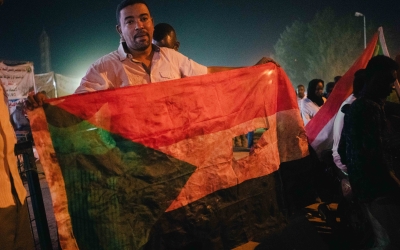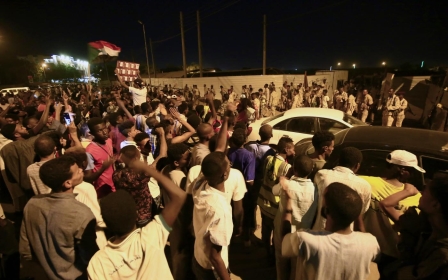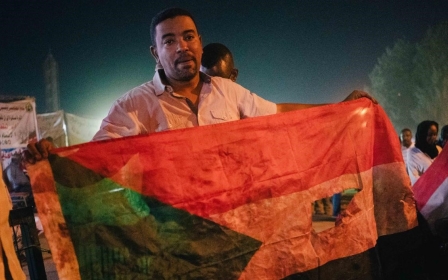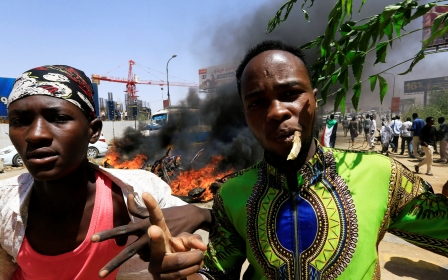Anxiety and mistrust prevail as Sudanese protesters await promised agreement

Even as Sudan's ruling military council and political opposition announced details of a potential transitional government, Sudanese protesters were defiantly building yet more of the barricades that now dominate the capital's streets.
After a month of laboured negotiations following the exit of former president Omar al-Bashir, the two parties said in the early hours of Wednesday morning that they had agreed on a three-year transitional period and the formation of a 300-member legislative council.
But an anxious standoff has persisted in Khartoum as people await the outcome of the next stage of negotiations, which are not set to resume for another 72 hours.
Sudan's army ruler General Abdel Fattah al-Burhan announced the suspension late on Wednesday in a statement broadcast live on state television.
"We decided to suspend the negotiations over civil rule for 72 hours to help prepare an atmosphere for completing the deal," Burhan said, demanding that protesters dismantle roadblocks in Khartoum, open bridges connecting the capital and other regions and "stop provoking security forces".
New MEE newsletter: Jerusalem Dispatch
Sign up to get the latest insights and analysis on Israel-Palestine, alongside Turkey Unpacked and other MEE newsletters
'Accountability is the only thing that can satisfy the people'
- Ahlam Khidir, whose teenage son was killed in 2013 protests
Meanwhile, hundreds of relatives and friends of the scores of people killed in protests against Bashir's government gathered to reject the agreement, demanding that power be handed over to a full civilian body, and for accountability for the killings.
Ahlam Khidir's son, Hazzaa Ez Aldin, was killed during anti-government protests in 2013 in Sudan.
She said the current protest movement could not be considered successful until her 17-year-old son's killers were brought to justice.
"With full respect to the political parties, I still believe that we haven't achieved the goals of our revolution," she told MEE from the sit-in outside the army headquarters in Khartoum, where protesters have been camped out since 6 April.
"Accountability is the only thing that can satisfy the people," Khidir said.
Months of protest
The demonstrators first erected the sit-in camp in April to ramp up their protest movement.
The demonstrations began in December, with thousands taking to streets across the country to demand that Bashir step down after three decades in power.
The protests continued following the longstanding president's ouster in a military coup - and after the Transitional Military Council (TMC) that replaced Bashir said it would remain in power for a two-year transitional period.
Since then, there have been several rounds of talks between the council and protest leaders about forming a transitional, joint military-civilian authority.
The sit-in came under its most serious attack since Bashir's exit on Monday, when a shooting blamed on the Rapid Support Forces (RSF) paramilitary group left at least six protesters dead, according to the Sudanese Doctors' Union, which is tied to the protest movement.
That night of violence has inflamed tensions in the capital.
On Wednesday, the doctors' union said at least 14 people were wounded after shots were fired near the sit-in once again.
In response to this week's violence, the protesters have built scores of barricades - initially put in place to protect the sit-in - around the city to block off main roads and prevent military vehicles from approaching the protest site.
"We don't trust the army at all, especially as it remained part of the old regime until the last moment before it fell," said Hassan Tahir, an activist sitting near one of the barricades near the sit-in.
"So we will stay here until the power has been fully handed over to a civilian authority," Tahir told MEE.
Lack of trust
On Wednesday, Sudanese soldiers began clearing the barricades on Mek Nimr road, which links Khartoum to its sister city, Bahri, and sits only a few hundred metres from the presidential palace.
One of the protesters guarding the barricades, 28-year-old Barakat, looked on from a side street, appearing concerned.
He said that while details of a prospective deal between the TMC and Sudan's political opposition made him happy, it would not prompt him to move because he was suspicious of the military council.
"The barricades are staying, I'm staying," he told MEE. "We'll see the path ahead and if they're not lying, fine. If they're lying, [we're staying]."
About 30 minutes after the military cleared the barricades, footage broadcast live on Facebook showed protesters rebuilding them on Mek Nimr road.
Elsewhere around Khartoum and its sister cities of Bahri and Omdurman, protesters built more barricades throughout the day, while military forces went around trying to remove them, multiple eyewitnesses told MEE.
The Sudanese Professionals' Association, an umbrella group that has organised the protests, called on people to remain at the sit-in outside the army headquarters to pressure the TMC to implement the agreements reached during recent talks.
However, Monday night's attack at the sit-in, which the army and RSF paramilitary group both blamed on counter-revolutionary "infiltrators", has increased peoples' lack of trust in the military.
'Egypt, Saudi Arabia and the [United Arab Emirates] are all attempting to copy and paste the experience of the Egyptian regime onto Sudan, so that democracy can't reach its logical end, but only reproduces the old regime with new faces'
- Khalid Ahmed, academic
"We don't trust the army," said Girifna, a student-founded, Sudanese peace movement, in a statement on Wednesday that called for civil disobedience and a full handover of power to civilians.
"Especially after what happened on Monday night, when the protesters were hunted down by the guns of the Rapid Support Forces, without any intervention from the army," the group's statement continued.
This sense of mistrust may cause setbacks for the current talks, said Sudanese academic Khalid Ahmed.
He told MEE that elements belonging to Bashir's old guard remain strongly opposed to any agreement between political parties and the military, as are several external powers.
"Egypt, Saudi Arabia and the [United Arab Emirates] are all attempting to copy and paste the experience of the Egyptian regime onto Sudan, so that democracy can't reach its logical end, but only reproduces the old regime with new faces," Ahmed said.
"Civil disobedience is very likely as people are seriously mobilised for it, especially if there is any setback during the talks between the two sides in the imminent future."
Middle East Eye delivers independent and unrivalled coverage and analysis of the Middle East, North Africa and beyond. To learn more about republishing this content and the associated fees, please fill out this form. More about MEE can be found here.





